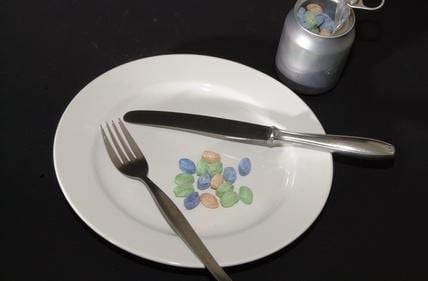It’s almost impossible not to be a little curious about hoodia. There are a baffling and extensive choice of nonprescription weight loss aids on the market, but manufacturers have gone out of their way to promote Hoodia gordonii as the holy grail of natural appetite suppressants. The truth about hoodia weight loss products is far less enthralling than marketing claims, however. There’s been scant research conducted on how hoodia actually works in the human body. Furthermore, many hoodia products aren’t likely to contain real hoodia gordonii.
The History of Hoodia
Hoodia’s appetite-curbing qualities were first noted back in the 1930s by Dutch anthropologists studying natives of the Kalahari Desert in South Africa, the region where this succulent thrives. San Bushmen chewed on hoodia and drank the milk that flows from its stems before long hunts, when food would be in scarce supply. The University of Michigan Health System points that hoodia gordonii has been harvested to the point where it’s considered endangered. An international treaty, the Convention on International Trade in Endangered Species, blocks its export from South Africa.
What Makes It Work?
Phytopharm, a United Kingdom-based pharmaceutical company devoted to developing botanically based medicines, has identified the active constituent that makes hoodia work. Phytopharm holds an exclusive license to this molecule, dubbed P57, and is researching its potential as a weight loss medication. Purportedly, P57 has a similar effect on the brain as glucose–it makes you feel full, even if you haven’t eaten. In turn, this reduces impulse eating and over-indulging and gives you a longer time between meals during which you feel no need to eat.
Hoodia Weight Loss
Problematic with the hoodia weight loss products you see advertised is that they probably don’t contain real hoodia gordonii. Remember, there are strong regulations in place preventing this succulent from being exported from its native country. Integrative physician Dr. Andrew Weil relays an interesting report from a British Broadcasting Corporation correspondent who had a hoodia supplement purchased off the Internet analyzed. The results? No hoodia gordonii. According to Weil, the BBC reporter went to Kalahari and ate hoodia, native-style. It was a full day before his appetite returned. Hoodia weight loss products are classified as dietary supplements by the U.S. Food & Drug Administration, so the quality of the product you purchase isn’t guaranteed.
The Future of Hoodia
Phytopharm purportedly conducted its own research on hoodia in a double-blind, placebo-controlled clinical trial that indicated that overweight study group participants ate around 1,000 few calories a day while taking hoodia. However, Dr. Weil and doctors at the Mayo Clinic still have doubts. Weil points out that the large pharmaceutical company, Pfizer, at one time held the rights to hoodia but gave up on developing a product in the early 2000s. The bottom line on hoodia is that there’s still not enough clinical evidence to suggest that it works. As such, it’s difficult to know what side effects are associated with hoodia or if it interacts with other medications.
Keep This in Mind
Natural weight loss products you buy without prescription, such as those that may contain hoodia, are not in the same class as prescription drugs. They haven’t gone through the stringent approval process established by the FDA to make sure they are both safe to use and effective in doing what they claim to do. Mayo Clinic’s Brent A. Bauer, M.D., points out that the FDA has had to caution makers and sellers of hoodia weight loss products against making claims that were false or misleading. Natural weight loss products may not be the best way to start your pound-shedding plan. Before using hoodia or another dietary supplement to lose weight, please talk to your doctor.
Photo Credit
- doping 2 image by Oliver Woelki from Fotolia.com





